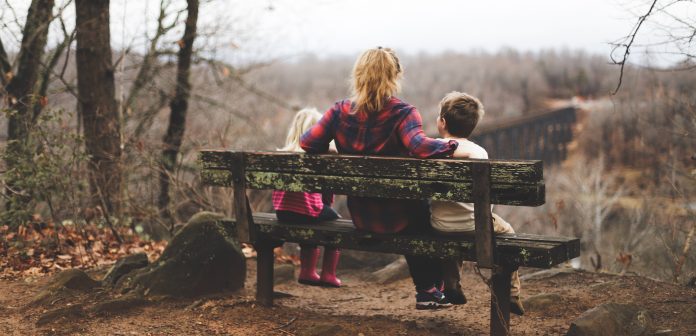One universal truth is that we cannot always control what happens to us. While every parent wishes that they could shield their children from traumatic events, it just isn’t possible. Sicknesses, natural disasters, losses, and even tragedies occur beyond our control. What is important is how we respond.
How do we talk to our kids about the tough stuff without instilling fear? Is there a way to keep them educated about what is happening in our world without making our children carry the burdens of fear or trauma? How do we shield them from these topics when they then go to school or ride the bus the very next day with their peers?
 In all reality, children will see tough stuff on TV, hear snippets on the radio, and even read about them on the internet. As we have come to learn, traumatic events can even happen to our children. Events do not have to be severe for our children to need help processing. They can be as minor as a car accident or sick family member and still be just as impactful as the grand tragedies.
In all reality, children will see tough stuff on TV, hear snippets on the radio, and even read about them on the internet. As we have come to learn, traumatic events can even happen to our children. Events do not have to be severe for our children to need help processing. They can be as minor as a car accident or sick family member and still be just as impactful as the grand tragedies.
The tough stuff will always be there – we can only control how we respond to it. And if you are anything like me, you have been wondering how to approach these scary conversations with your children for the past few months because it’s definitely hit closer to home. Thankfully, experts at EIRMC’s Behavioral Health Center have provided amazing strategies and tips that we can use to talk with our kids.
As a mother, here are ways you can help make a difference in your home, for your children.
Our brains are wired to make sense of the world.
For our survival, our brains quickly take in and process overwhelming amounts of information. This helps us to feel in control of our surroundings and gives us a sense of security.
However, during tough situations, our brain works overtime trying to process the events. It is human nature to want to be in control, so our children will take what they already know and try to use that information to return to a state of normalcy after a tragedy.
With the brain trying to process and make meaningful connections between so much information, many children can become overwhelmed, develop misconceptions, and even create more fear and uncertainty. It is during this critical time that our intervention as parents is most important. If you aren’t certain about how to move forward talking to your child, waiting for the “right” opportunity may not be in your child’s best interest.
Focus on building honest, strong, and supportive relationships with your kids.
 When tough stuff happens, I don’t want my child turning to an older student on the bus or another kid in their classroom; I want them to come to me. In order for our children to feel confident turning to us, we need to create strong relationships before tragedy strikes.
When tough stuff happens, I don’t want my child turning to an older student on the bus or another kid in their classroom; I want them to come to me. In order for our children to feel confident turning to us, we need to create strong relationships before tragedy strikes.
Strong relationships are built through honesty and connection. Our kids are smart and have an uncanny ability to know when we aren’t giving them the full truth. If they don’t believe that you will be honest with them, they will seek information from a different source.
Ways to build positive relationships include respecting your child and allowing them to express their feelings in age-appropriate ways, showing interest in their hobbies, being available when they need support, upholding your promises, and valuing your children as they are.
Fifteen minutes of uninterrupted, one-on-one time with your child daily can have significant impacts on your relationship. Warm, loving, and responsive interactions during these fifteen minutes can support positive relationships between parents and children. When your child knows that you are someone they can rely on, they will turn to you for support.
Response to tragedy changes with age.
As our brains develop and mature, our relationship with the world changes. Our response to the tough stuff also matures significantly.
 Young, school-aged children respond to scary or hard things by asking questions. Their questions can be strange and seem disconnected from the event, but having answers to their questions can help them develop awareness and feelings of control about the situation. What may seem silly or insignificant to you can be extremely important for your child, especially if they have a misconception about the events. Answering all of their questions honestly and to the best of your ability can help them sift facts from fiction while processing.
Young, school-aged children respond to scary or hard things by asking questions. Their questions can be strange and seem disconnected from the event, but having answers to their questions can help them develop awareness and feelings of control about the situation. What may seem silly or insignificant to you can be extremely important for your child, especially if they have a misconception about the events. Answering all of their questions honestly and to the best of your ability can help them sift facts from fiction while processing.
Middle-aged children respond by talking or acting out situations. Role-playing can help them to process the events, as well as prepare themselves for upcoming or anticipated fears. Talking and role-playing before and after moments of transition, or through scary events, can help provide guidance and reassurance to our tweens and teens. Your child may not seem eager at first, so try modeling for yourself or asking them to help you role-play a situation from your life first.
Older teens no longer want to role play. Instead, they want to take action. Help them find a purpose for their response by conversing about factual information and their ability to make a change. Teenagers can successfully plan and take action in ways we may not anticipate, but they are capable. Be prepared to converse and then provide support for the change they want to make, even if it might not be the change you would make. Providing encouragement, support, and even grounding for their plan shows your teens that you have faith and confidence in them.
Sometimes, despite our best work to help our children process traumatic events, we may need more help. If your child is fearful, anxious, or struggling to comprehend difficult life events, EIRMC specialists recommend speaking with a licensed professional counselor in the community or through your child’s school.
We cannot always control the tragedies our children are exposed to, but we can control how we respond to them. Providing support for your child through the tough stuff can bring about peace, as well as strategies and skills for overcoming future events.












